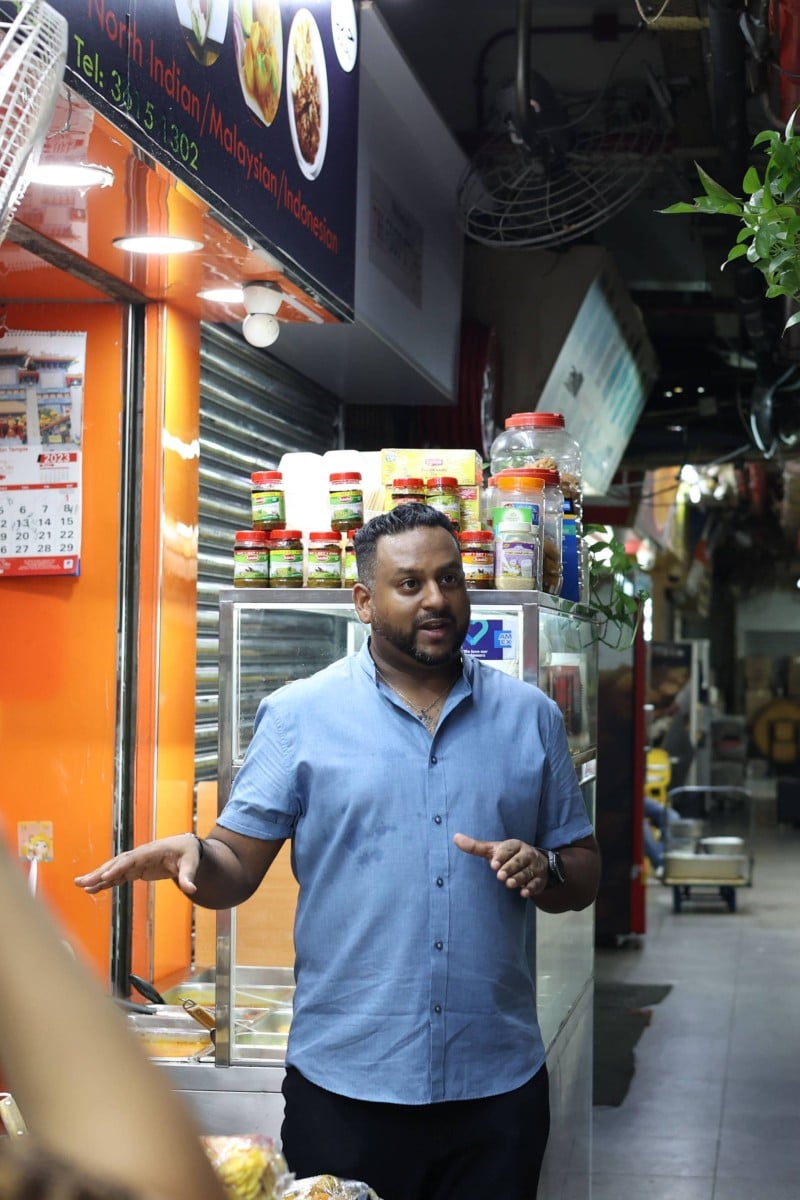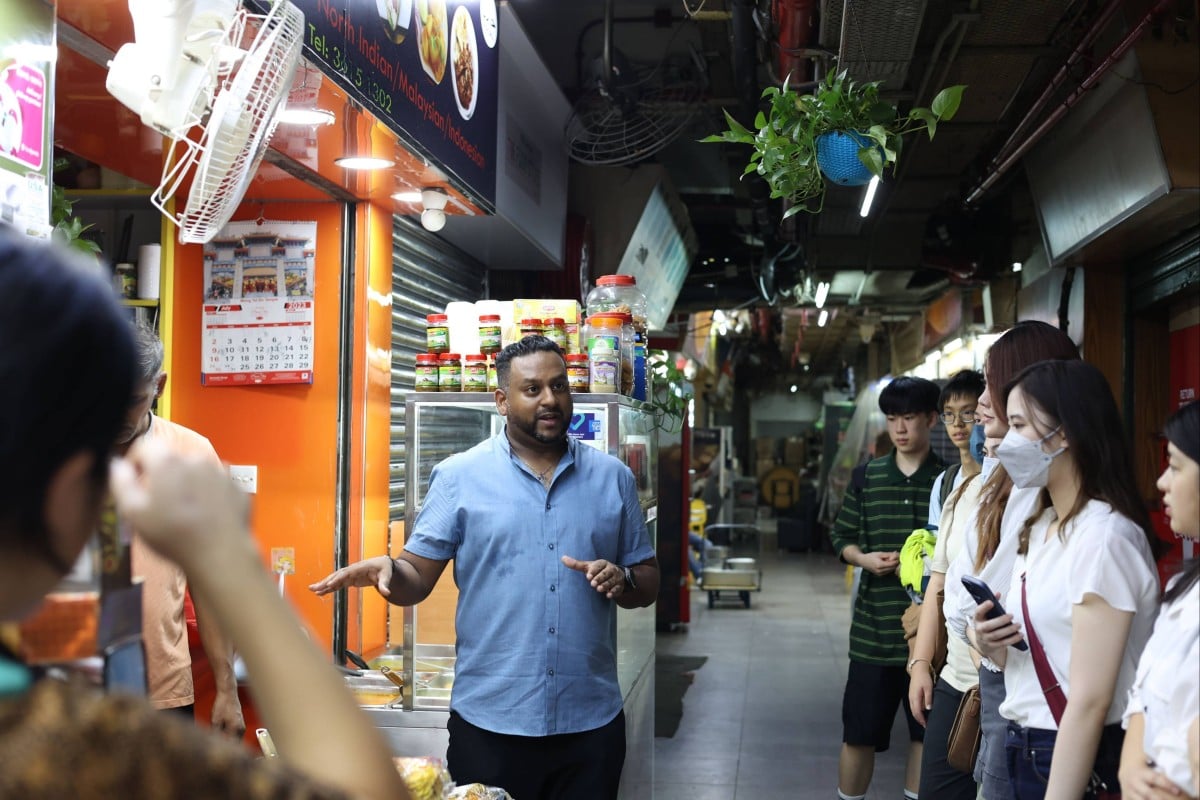
- Led by Jeffrey Andrews, Hong Kong’s first ethnic minority social worker, the tour aimed to break stereotypes about the famous Tsim Sha Tsui building
- Students and interns from Young Post learned about different food and religions and heard stories from the city’s asylum seekers
 Students and Young Post interns tour Chungking Mansions, guided by Hong Kong’s first ethnic minority social worker, Jeffrey Andrews. Photo: Stanley Le
Students and Young Post interns tour Chungking Mansions, guided by Hong Kong’s first ethnic minority social worker, Jeffrey Andrews. Photo: Stanley LeFour students and seven interns from Young Post participated in a five-sense tour exploring Hong Kong’s renowned Chungking Mansions on Tuesday.
The tour, which aimed to promote cultural understanding among young people, was led by Jeffrey Andrews, Hong Kong’s first ethnic minority social worker, who guided participants through the building’s different shops and shared his knowledge about the issues facing refugees in Hong Kong.
“There are three things [I hope the participants can do]: to break the stereotypes of Chungking Mansions, see the unity of diversity in Hong Kong, and embrace different cultures, traditions and religions,” he said, adding that he hoped more Hongkongers could visit Chungking Mansions in person instead of simply learning about it at school.
Inside Chungking Mansions: 5 blocks of diversity, culture and community
Chungking Mansions, built in 1961, is a 17-storey building in Tsim Sha Tsui. It has long been a hub for budget travellers, backpackers, and migrants and become a melting pot of cultures, languages, and cuisines, making it a unique and fascinating place to visit. It has also been featured in numerous films, including Wong Kar-wai’s 1994 classic Chungking Express.
As the tour unfolded, participants explored a variety of shops and restaurants, each offering a unique glimpse into a different culture.
They saw beautiful Muslim prayer rugs decorated with traditional patterns, tasted warming Indian ginger tea, and one participant even tried threading, a method to remove facial hair using a long piece of thread, in a Pakistani hair salon.
The group also went up to the rooftop, which gave them a better sense of the size of the five interconnected blocks that make up the mansions.
One student participant, Brogan Enid-Lus Archer, 14, said, “I gained a lot of knowledge about different cultures, religions and the real world. The different stalls taught me about Sikhism, Islam, and Christianity, and I also learned about cuisine from places like south India and Ghana”.
Another student, Yoyo Ngai, admitted that she hadn’t dared visit Chungking Mansions alone due to the stigma, saying the tour taught her a valuable lesson.
‘Tastes from (My) Home’ dinner showcases talents, diversity of city’s asylum seekers
“It was a huge eye-opener. I was very impressed and drawn to all sorts of new food and new things I’ve never really experienced,” said the 16-year-old.
The tour also included a visit to the NGO Christian Action Centre for Refugees, located on the 16th floor of Block E. The centre provides support for ethnic minorities and asylum seekers in Hong Kong.
Around 15,000 people in Hong Kong are seeking asylum; since 2014, only 269 have been given official refugee status. Hong Kong does not grant asylum or allow people to stay permanently; instead, it acts as an “in-between” place as refugees wait to resettle somewhere else, which can take years.
The NGO empowering Hong Kong’s refugee population
Poules Zaki, a former journalist from Egypt, is one of the city’s few asylum seekers who has received refugee status. Despite getting his official resettlement letter from the United Nations refugee agency more than four years ago, he is still waiting to move to his host country, Canada.
Zaki shared his life-changing journey, explaining how he has been stuck in Hong Kong for 10 years after reporting on religious conflicts between Muslims and Christians from the front lines in Egypt and documenting scenes of military brutality. As a Christian journalist, he feared for his life after a group of soldiers beat him up, and he became the target of extremists.
Zaki’s story touched Brogan, who said, “It opened a door for me to understand the burdens some people [have] … I can see how each individual is hard-working and determined.”
Esther Cheung, the organiser of the tour and a production editor at Young Post, said she was glad that students could meet Zaki, hear his story, and learn about the issues facing refugees and asylum seekers.
“I hope they got to step out of the bubbles of their communities and learn about the city’s diversity, as well as the many interesting stories of the people who call Hong Kong home,” she said.
